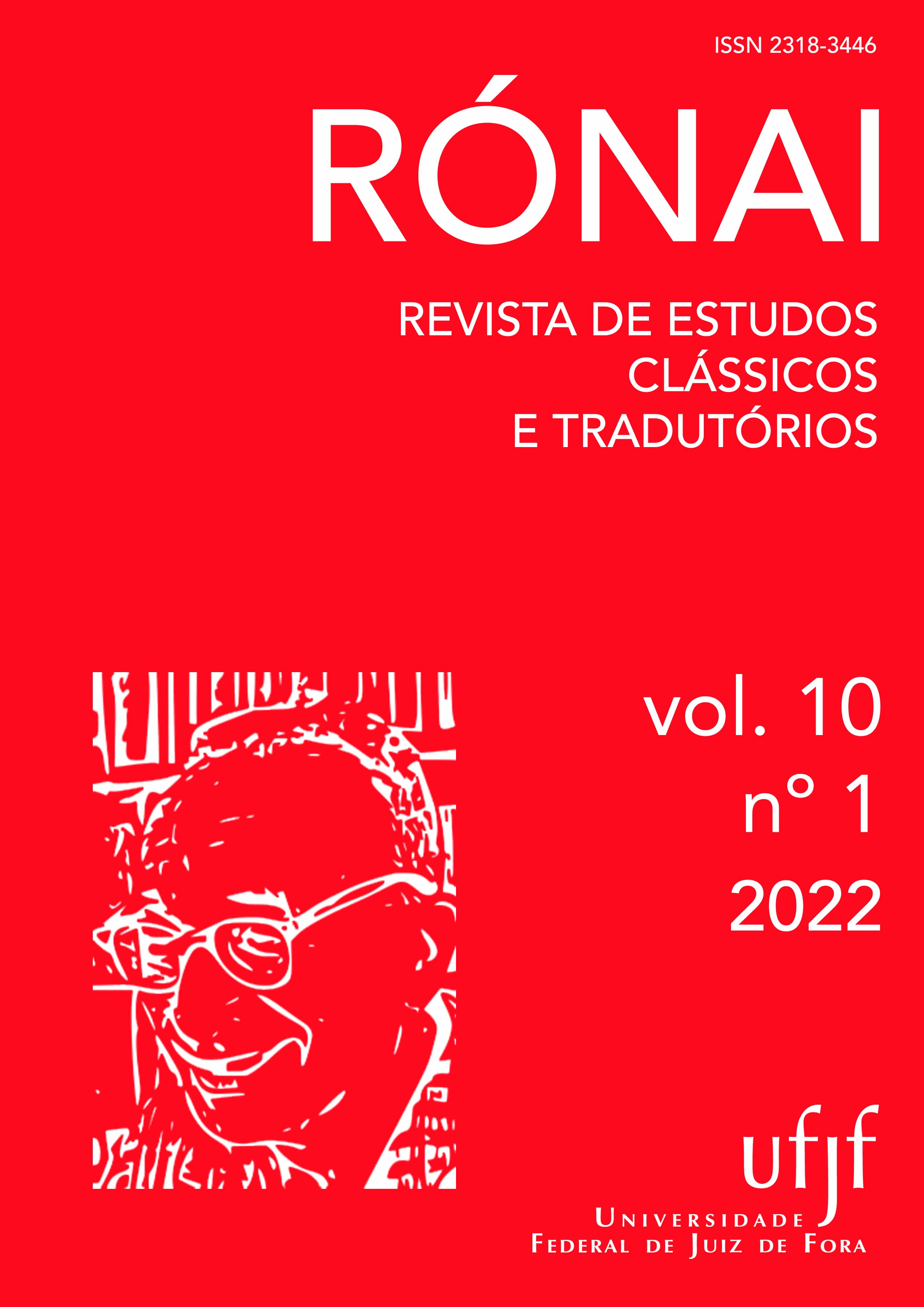Uma proposta de tradução da Écloga IV, de Virgílio, em hexâmetros portugueses
DOI:
https://doi.org/10.34019/2318-3446.2022.v10.36805Palavras-chave:
tradução rítmica, hexâmetros dactílicos, poesia bucólica, métricaResumo
Este trabalho tem como objetivo apresentar uma tradução rítmica da Écloga IV, de Virgílio, reconhecida como um dos mais importantes poemas das suas Bucólicas. Nesse poema em específico, composto em honra do cônsul e mecenas romano Asínio Pólio, é apresentada uma profecia sobre o nascimento de um menino que traria de volta a idade de ouro celebrada por poetas gregos e romanos como Hesíodo e Ovídio, por meio de um governo de paz e concórdia universais. O assunto de tal canto recebeu, desde a Antiguidade, as mais diversas interpretações, sendo famosas as leituras alegóricas medievais, que identificaram no poema uma mensagem profética sobre o nascimento do Cristo. Em vista disso, fica evidente a importância de tal obra e a consequente necessidade de se fazerem novos esforços para sua tradução. Por isso, propomos aqui um trabalho inédito de tradução rítmica desse texto que visa, com base nos modelos consagrados por Carlos Alberto Nunes, em suas versões das epopeias homéricas e da Eneida, recriar e emular o ritmo do hexâmetro latino.
Downloads
Referências
ALI, Manoel Said. Versificação portuguesa. São Paulo: Edusp, 1999.
CARDOSO, Zélia de Almeida. A literatura latina. Porto Alegre: Mercado Aberto, 1989.
CASTILHO, A. F. De. Tratado de metrificação portugueza: Seguido de considerações sobre a Declamação e a Poetica. 4ª ed. revista e augmentada. Porto: Livraria Moré-editora, 1874.
COMPARETTI, Domenico. Virgilio nel medioevo. 2° ed. Gaeta: Passerino editore, 2019.
CRUSIUS, Federico. Iniciación en la métrica latina. Versión y adaptación de Ángeles Roda. Barcelona: Bosch, 1987.
DRUMMOND, Adriano Lima; MIRANDA, José Américo. O alexandrino português. O eixo e a roda. Belo Horizonte, v. 14, p. 15-28, 2007.
GOLDSTEIN, Norma. Versos, sons e ritmos. São Paulo: Editora Ática, 1989.
GONÇALVES, Rodrigo Tadeu. L’hexamètre au Brésil: la tradition de Carlos Alberto Nunes. Anabases - traditions et réceptions de l’Antiquité. E.R.A.S.M.E, 20, 2014, p. 151-164.
GONÇALVES, Rodrigo Tadeu. Tradução e ritmo: rêver le vers de Lucrécio. Morus: Utopia e Renascimento, v. 11, n° 1, 2016, p. 183-197.
HOMERO. Ilíada. Tradução e introdução de Carlos Alberto Nunes. São Paulo: Editora Hedra, 2011.
NATIVIDADE, Everton. O último pé e a cesura nos versos núnicos e as Púnicas de Sílvio Itálico. Scientia traductionis. Florianópolis, n. 13, 2013, p. 312-328.
NETO, João Ângelo Oliva. O hexâmetro datílico de Carlos Alberto Nunes: teorias e repercussões. Revista Letras. Curitiba, n. 89, p. 187-204, Jan./Jun. 2014.
NETO, João Ângelo Oliva; NOGUEIRA, Érico. O hexâmetro dactílico vernáculo antes de Carlos Alberto Nunes. Scientia Traductionis. Florianópolis, n. 13, p. 295-311, 2013.
NOGUEIRA, Érico. Verdade, contenda e poesia nos idílios de Teócrito. São Paulo: Editora Humanitas, 2012.
NUNES, Carlos Alberto. Ensaio sobre a poesia épica. In: NUNES, Carlos Alberto. Os Brasileidas. São Paulo: Edições Melhoramentos, 1962.
TÁPIA, Marcelo. Diferentes percursos de tradução da épica homérica como paradigmas metodológicos de recriação poética. Tese (doutorado em teoria literária e literatura comparada). Programa de pós-graduação em teoria literária e literatura comparada, Universidade de São Paulo, São Paulo, 2012.
VIRGÍLIO. A Eneida. Tradução de Carlos Alberto Nunes. São Paulo: Editora 34, 2014.
VIRGÍLIO. Bucólicas. Tradução de Raimundo Carvalho. Belo Horizonte: Crisálidas, 2005.
VIRGÍLIO. Obras completas. Traducción de Aurelio Espinosa Pólit. 5ª ed. Madrid: Ediciones Cátedra, 2016.
Downloads
Publicado
Como Citar
Edição
Seção
Licença
Copyright (c) 2022 Saulo Santana Aguiar

Este trabalho está licenciado sob uma licença Creative Commons Attribution 4.0 International License.
Direitos Autorais
Autores que publicam nesta revista concordam com os seguintes termos:
1. Autores e autoras mantém os direitos autorais e concedem à revista o direito de primeira publicação, sendo a publicação licenciada sob a Creative Commons Attribution License 4.0 Internacional.
2. Os autores e autoras têm permissão e são estimulados(as) a publicar e compartilhar o trabalho com reconhecimento da publicação inicial nesta revista.
3. Os autores e autoras dos trabalhos aprovados autorizam a revista a ceder o conteúdo de seus trabalhos, após sua publicação, para reprodução em indexadores de conteúdo, bibliotecas virtuais e similares.
Para mais informações sobre a Creative Commons Attribution 4.0 International License, acessar: https://creativecommons.org/licenses/by/4.0/
Isenção editorial
O conteúdo dos artigos publicados é de inteira e exclusiva responsabilidade de seus autores, não representando a posição oficial da Rónai - Revista de Estudos Clássicos e Literários ou do Faculdade de Letras da Universidade Federal de Juiz de Fora ou das instituições parceiras.



